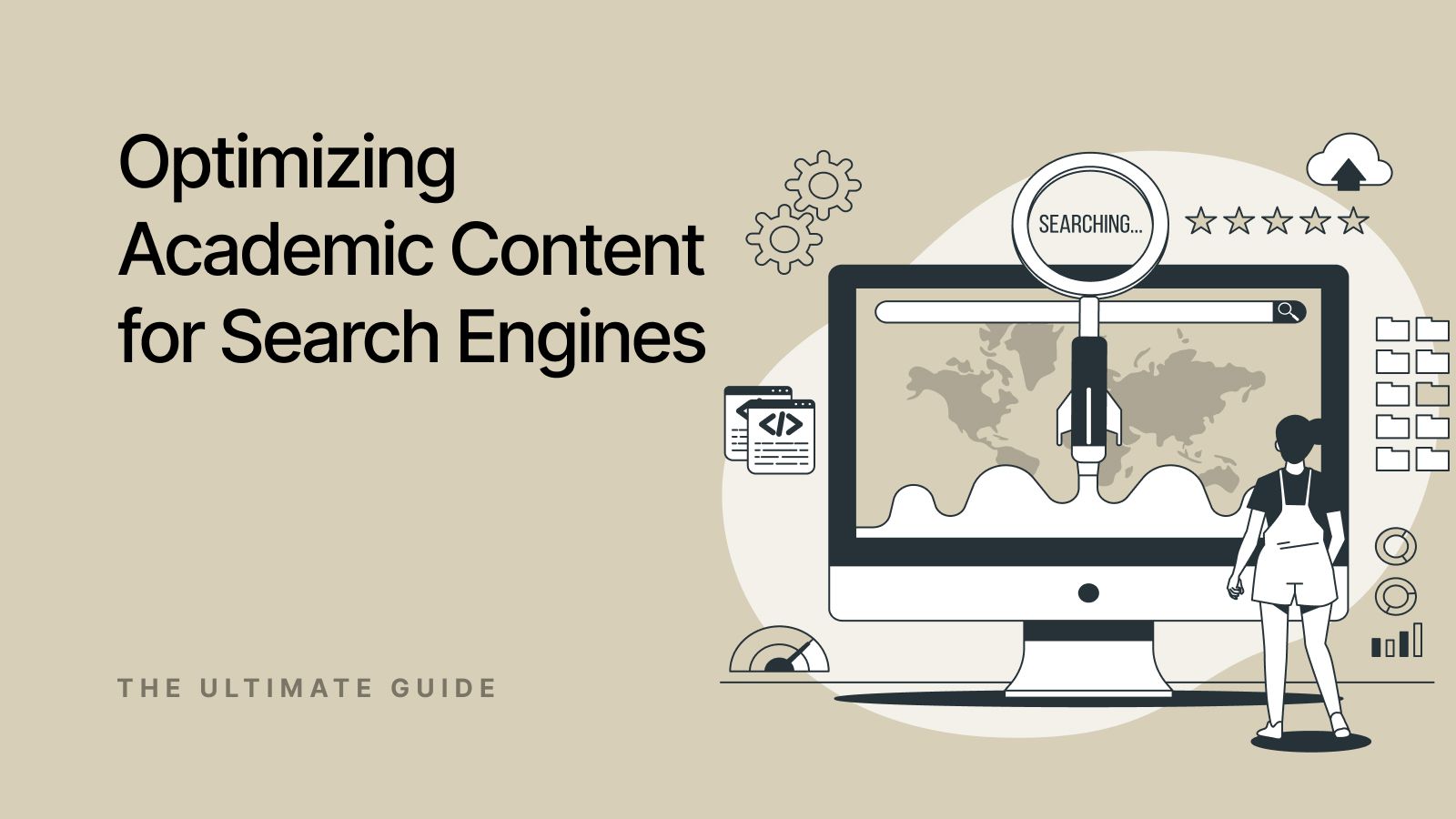Are you struggling to get your academic papers, publications, and other scholarly content found online? Search engine optimization is the way to go. SEO is critical for expanding the reach and impact of academic work. However, scholarly writing has its own unique challenges when it comes to SEO.
Navigating academic content's complex terminology and citation-heavy nature requires specialized optimization strategies. And that's not all – you also need to understand the importance of regular monitoring and using analytics to judge the performance of those tactics.
A good idea is to use some well-rounded software solution, which you can find by comparing the best options on Top 10 SEO Software. These software solutions not only help you with keyword research but also perform a comprehensive site audit to identify strategies that may or may not be working for you.
Remember that you must approach SEO differently to optimize your academic content. Let's find out what you can do to improve visibility and get higher retention rates.

Source: Pixabay
Understanding SEO for Academic Content
SEO (search engine optimization) is important for increasing the visibility and discoverability of content like journal articles, books, and educational resources. There are some key differences between general SEO practices and those specific to academic content. For instance:
| Component | Description |
|---|---|
| Keywords | Descriptive terms used in a research field, identified with tools like Google Trends. |
| Quality and Depth | High-quality, expert-driven content citing reputable sources; thin content doesn't rank well. |
| Backlinks | Links from authoritative sources like universities and scholarly publications boost rankings. |
| Metadata | Rich metadata (e.g., JATS XML) aids proper indexing, including titles, descriptions, and keywords. |
| Freshness | Regular updates with new research enhance rankings and credibility. |
Fundamental SEO Concepts for Academic Content
Most academic writing uses specialist terminology, but often it is unhelpful in a search inquiry. Academic content that relies on it risks poor visibility, but there are several concepts that maximize SEO for academic content.
1. Keyword Research and Selection
Thorough keyword research and selection are essential good practices in SEO, but they’re vital for academic content. These keywords must be relevant but also broad to catch all the possible search terms.
Identifying Relevant Keywords for Academic Articles, Papers, and Publications
The keywords should be relevant to the target audience. For academia, the selection should include the expected academic language and the most common search-friendly terms. In any case, the keywords selected should reflect the site’s:
- content
- core topics
- key concepts
- methodologies
Tools and Techniques for Keyword Research in Academic Fields
There are several tools and techniques that aid keyword research, including:
- Google Keyword Planner, for search volume, competition and related terms.
- Google Scholar and Academic Databases to discover previously used search terms based on similar content.
- Conference Proceedings and Journal Calls for Papers to identify similar trending topics and their search terms.

Source: Scholar Google
Balancing Academic Terminology with Search-friendly Language
For sites specializing in academic content, effective keyword research begins with considering online searches from the audience's point of view. The aim is to balance the specialized vocabulary with related terms likely used by students or the public.
When optimizing your content, bear in mind that including synonyms makes content more accessible, raising its visibility to the search engines.
2. Structuring Academic Content for SEO
To optimize your academic content, always remember that search engines prefer well-structured pages. Along with better readability and navigation to enhance the user experience, these conventions signal quality content. This increases the chances of a good rank on search engines.
The Importance of a Clear, Logical Structure in Academic Writing for SEO
Search engines need to understand content quickly to index and rank it. Sectioned by headings, it is easier and faster to understand. Consequently, search engines favor sites that have a clear hierarchical structure.
Tips for Optimizing Titles, Headings, and Subheadings
To maintain a logical structure, you should always begin by optimizing titles and headers.
- Create a clear yet concise title (15 words max), including relevant keywords
- Treat header tags as mini-titles, giving them a limit of 70 characters
- Use a single H1 tag for the main topic and H2-H6 as subtopics, as in a book
- Keep headings and subheadings consistent in style and length
Using Abstracts and Summaries for Effective Keyword Integration
The wide availability of abstracts and summaries makes them ideal options for keywords.
To benefit the SEO, abstracts should include keywords:
- Naturally, since stuffing keywords harms SEO
- In the title and subtitle
- That reflect the main content or theme
3. On-Page Optimization for Academic Articles
On-page optimization takes a strategic approach to raising the visibility of academic content. It also raises the content’s citation potential, which benefits all the SEO.
Best Practice for Meta-tags (Title Tags and Meta Descriptions) in Academic Content

Source: w3schools
On-page optimization involves adding information via meta-tags and descriptions. The process includes:
- A title tag – around 50 characters that summarize the main topic
- Meta description – about 150 characters describing the purpose of the article, its methods, and findings
- Keywords – between 5 and 10 covering the main topic and key terms
The Role of Alt Txt for Images and Figures in Enhancing SEO
Search engines use alt text to understand the context of images and figures. It also enhances accessibility by offering an alternative way to convey information.
To be effective, alt text must:
- Provide the information needed for access
- Be descriptive with relevant keywords used naturally
- Be concise, under 125 characters
Internal Linking within Academic Portals or Repositories
Internal links connect pages within a site and help spread authority across pages. They can be used to connect:
- related pages or articles
- related sections within an article
- images tables to the main text for citation
4. Accessibility and Mobile-Friendliness
Accessibility and mobile-friendliness are important factors to consider. Though accessibility itself is not a ranking factor, it is linked to user experience. Sites rank higher when they optimize for search engines. You can do it by ensuring the following:
- Fast load speeds on any device
- Easy navigation with an intuitive flow
- Understandable content
- User-friendly content, including for users with disabilities
Advanced SEO Strategies for Academic Content
Once you finish getting the basics right, you need to adapt more advanced SEO strategies to supercharge your results. Here's what to do:
1. External Link Building
External link building is generally a good SEO practice, but there are particular advantages for academic content.
The Significance of Citations and References in Academic SEO
It’s especially relevant to academic content where the value of citations and references by peers cannot be understated. Peer links play a pivotal role in academic SEO. They signal there is value in the content, and it has credibility. Citations are, therefore, one of the key ranking factors for Google.
Strategies for Increasing Inbound Links from Reputable Academic and Research Sites
- To increase inbound links, you can do the following:
- Publish research with value using original data
- Create tools and resources applicable to academia, e.g. Perish citation
- Guest post or blog on similar reputable domains
- Volunteer expertise for listing as a contributor
- Reach out to experts, professors and researchers
2. Content Promotion and Distribution
With no content promotion and distribution, even high-quality content can fail to find its audience. This is why academic SEO is so important. There is a selection of strategies to consider.
For instance, you can utilize academic networks and social media to promote your content. Here's what to remember:
- Research the target audience and their online habits.
- Leverage social media platforms to share content, tailoring the message for engagement.
- Collaborate with teacher influencers to share content, increase reach and boost credibility.
- Promote on the academic networks, for example, Academia.edu and ResearchGate.
At the same time, you should never ignore the importance of utilizing the Gateway Framework. It connects library resources such as catalogs and databases. It’s a valuable portal for academic research that aids distribution.
3. Monitoring and Analytics
No matter how much attention you put into optimizing your academic content, you know it works only when you check the analytics.
Effective SEO monitoring relies on paid and free tools like Google Analytics, and Google Search Console for tracking organic traffic, keyword rankings, backlinks, and site crawl stats.
Regularly tracking keyword rankings pinpoints high-performing terms and optimization needs. Similarly, analyzing user behavior metrics aids content and site enhancement. But don't just focus on getting all that data; spend time evaluating and interpreting it to change your optimization strategy accordingly.
Ethical Considerations in Academic SEO
While optimizing your academic content, maintaining ethical practices and integrity is key for credibility. Fostering a culture focused on producing accurate, original work that provides value is essential.
| Academic Integrity | Ethical SEO Practices |
|---|---|
| Proper citation and permission to avoid plagiarism | Focus on valuable content over keyword targeting |
| Ethical data management for research validity | Transparent AI and automation communication |
| Seek feedback for improvement | Build natural, relevant links |
| Educate on integrity principles | Regularly review content for compliance |
| Avoid black hat tactics |
Conclusion
While SEO principles remain fundamental, optimizing academic content demands a nuanced approach due to its unique terminology and citation-heavy nature. Employing specialized strategies, such as meticulous keyword research, structured content organization, and ethical link-building practices, ensures scholarly work resonates effectively in digital spheres.
But also remember that only continuous monitoring of SEO metrics and adherence to ethical standards guarantee sustained credibility and relevance.
